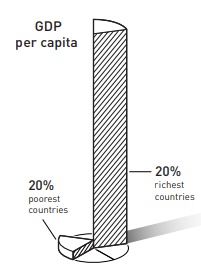Nobel Prize in economics for differences in prosperity among the countries (Prelims- Economy)
Why in News?
Recently, three laureates (Daron Acemoglu, Simon Johnson, James A. Robinson) were awarded for finding new insights into why there are such vast differences in the prosperity between the countries.
- Societies with a poor rule of law and institutions that exploit the population do not generate growth or change for the better, and
- Persistent differences in societal institutions.
About laureates explanation

- The richest 20 per cent of the world’s countries are now around 30 times richer than the poorest 20 per cent, and the income gap between them is persistent; although the poorest countries have become richer, they are still not catching up with the most prosperous.
- A correlation between the institutions in a society and its prosperity does not necessarily mean that one is the cause of the other. Rich countries differ from poor ones in many ways – not just in their institutions – so there could be other reasons for both their prosperity and their types of institutions. Perhaps prosperity affects a society’s institutions. The laureates have used an innovative empirical approach (a way of studying innovation that uses observable data and a repeatable process to produce verifiable results) to find this out.
Research of the laureates
Historical reasons: Acemoglu, Johnson, and Robinson did research on Europeans’ colonisation of large parts of the globe.
- In some places, the aim was to exploit the indigenous population and extract resources for the colonisers’ benefit.
- The current differences in prosperity are the political and economic systems that the colonisers introduced, which led to a reversal of fortune. The places which were the richest at their time of colonisation are now among the poorest.
- In addition, the laureates used mortality figures for the colonisers, among other things, and found a relationship – the higher mortality among the colonisers, the lower today’s GDP per capita because of settler mortality.
- The number of European settlers and the aspect of disease are also important explanations. The more European settlers, the greater the probability of establishing economic systems that promoted long-term sustainable economic growth and the bigger the population, the severity of the diseases that spread through the settler communities, which would dysfunction the economic system.
- Organised crimes make the economy weak.
- One explanation for differences in countries’ prosperity is the societal institutions that were introduced during colonisation.
a) Inclusive institutions were introduced in countries that were poor when they were colonised over time, resulting in a generally prosperous population. This is an important reason why former colonies that were once rich are now poor.
b) Some countries become trapped in a situation with extractive institutions and low economic growth.
The introduction of inclusive institutions would create long-term benefits for everyone, but extractive institutions provide short-term gains for the people in power. As long as the political system guarantees they will remain in control, no one will trust their promises of future economic reforms.
The laureates have developed an innovative theoretical framework that explains why some societies become stuck in a trap of extractive institutions, and escaping from this trap is difficult.
Escaping the Trap
Acemoglu, Johnson and Robinson have uncovered a clear chain of causality. Institutions that were created to exploit the masses are bad for long-run growth, while ones that establish fundamental economic freedoms and the rule of law are good for it. Political and economic institutions also tend to be very long-lived.
- The laureates found that Economies like the USA have inclusive institutions because of the American Revolution and have greater opportunities to choose education and profession. Here, people actively participate in the political system as well, which gives them broad political rights.
➤ America was colonised once and followed the path of the reversal of fortune, leading to the richest economy in the world.
➤ Another solution to escaping the trap is Inclusive societal institutions and the Rule of Law.
➤ A new political system, which allows the population to replace leaders who do not keep their promises in free elections, would allow the economic system to be reformed.
Institutions and the Rule of law help escape the prosperity trap
For the complex political, social, and economic transformation of society, there’s a need for a collective response that must be guided by the Rule of law(based on three pillars: international peace and security, human rights and development). It is not only going to push development but also provide sustainable growth to the economy, which will help poor countries escape the trap of prosperity difference.
Conclusion
Reducing the vast differences in income between countries is one of our time’s greatest challenges. The laureates’ empirical research demonstrates the fundamental importance of the type of political and economic institutions that were introduced during colonialisation. Their theoretical research has contributed to our understanding of why it is so difficult to reform extractive institutions while also pointing out some of the circumstances in which this can happen.


